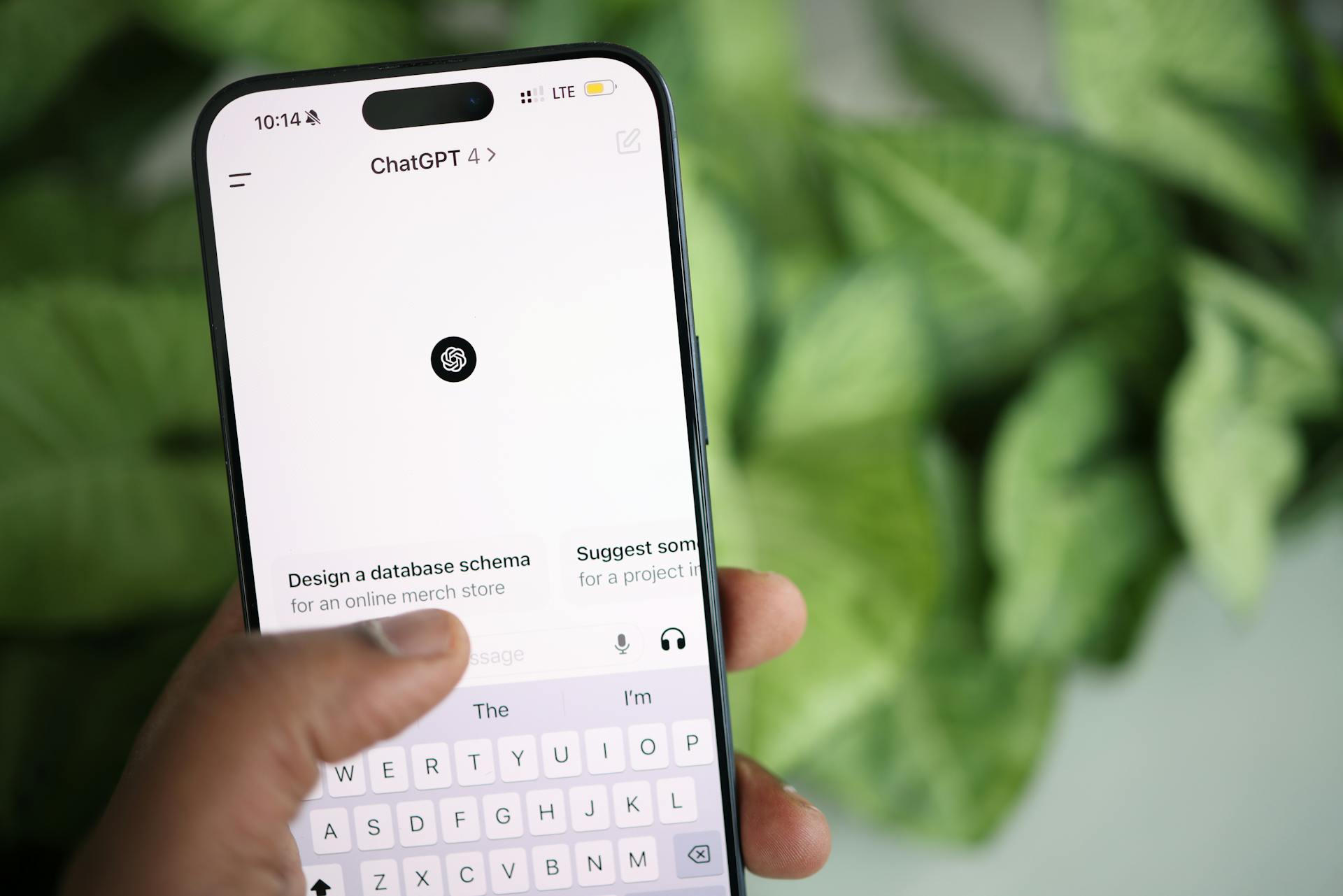
Claude 3 and ChatGPT 4 are two of the most advanced conversational AI models available today. Claude 3 is a large language model developed by Anthropic, capable of generating human-like responses to a wide range of questions and topics.
One key difference between Claude 3 and ChatGPT 4 is their approach to knowledge retrieval. Claude 3 uses a more traditional approach, relying on its large knowledge base to generate responses. ChatGPT 4, on the other hand, uses a more dynamic approach, generating responses based on the context of the conversation.
Claude 3 is known for its ability to provide detailed and accurate information on a wide range of topics. Its knowledge base is vast and up-to-date, making it a valuable resource for anyone looking for reliable information.
Recommended read: Is Chat Gpt Generative Ai
Claude 3 vs ChatGPT 4 Comparison
Claude 3 and ChatGPT 4 are both powerful AI models, but they have some key differences. Claude 3 outperforms GPT-4 in certain areas, such as knowledge, reasoning, and mathematical abilities, with a score of 50.4% in the GPQA benchmark, compared to GPT-4's 35.7%.
Here's an interesting read: Claude 3 Opus for Corporate Finance vs Gpt 4 Turbo
However, GPT-4 still seems to have a slight edge in most areas when comparing the more recent GPT-4-1106-preview model. GPT-4's multimodal capabilities, allowing it to process both text and images, open up a wide range of potential applications and give it a distinct advantage over Claude 3.
Claude 3 can do a lot of the same things as ChatGPT, including answering questions and providing information, but it has some limitations. Claude 3 is only trained on the information that the developers at Anthropic have provided it with, which is limited to August 2023, while ChatGPT has internet access and can look beyond its training data.
One area where Claude 3 shines is in its ability to process multilingual text, a feature that is not available in the free version of ChatGPT. However, ChatGPT's free version does offer access to the GPT Store, which allows users to personalize the chatbot to respond to their questions and queries in different ways.
Accuracy is an area where both models struggle, and they have been known to "hallucinate" and create their own facts and data. However, my own experience has shown that Claude 3 tends to be more factually accurate when summarizing things than ChatGPT.
Here's a comparison of the two models:
It's worth noting that both models have their own strengths and weaknesses, and the choice between them will depend on the specific needs and requirements of each user or application.
Knowledge and Capabilities
Claude 3 Opus has a comprehensive understanding of diverse academic topics, rivaling that of a well-educated human, with an impressive 86.8% score in the MMLU benchmark.
It outperforms GPT-4 in the GPQA benchmark, scoring 50.4%, significantly outperforming GPT-4's 35.7%, suggesting advanced ability to analyze complex information and draw accurate conclusions.
Claude 3 Opus also excels in the GSM8K benchmark, scoring 95%, outperforming GPT-4's 92%, demonstrating the model's ability to apply mathematical reasoning and solve complex problems with high accuracy.
Take a look at this: Claude Ai Pro vs Chatgpt 4
Math and Coding Skills
Claude 3 Opus demonstrates impressive mathematical and coding abilities, as evidenced by its performance on various benchmarks. It achieves a score of 60.1% in the MATH benchmark, which evaluates mathematical problem-solving skills.
Claude 3 Opus's performance on the MATH benchmark suggests a strong ability to tackle complex mathematical problems. This is a valuable skill in various industries, from finance to engineering.
Claude 3 Opus showcases its prowess in the HumanEval benchmark, scoring 84.9%. This benchmark assesses a model's ability to generate code that meets specific requirements and passes a set of test cases.
Claude 3 Opus's high score in the HumanEval benchmark indicates its proficiency in understanding and generating code, making it a valuable tool for developers and programmers.
Multimodal Capabilities
GPT-4 can process both text and images, but the image input capability is not yet publicly available.
This allows GPT-4 to generate text based on visual prompts, such as photographs and diagrams, opening up a wide range of potential applications.
GPT-4 can generate code from rough sketches of website designs, as demonstrated by OpenAI's president and co-founder, Greg Brockman.
However, GPT-4's multimodal capabilities are still limited, and the model cannot generate images itself.
GPT-4 may struggle with tasks requiring precise localization or layouts, such as reading analog clock faces or describing the exact positions of chess pieces.
Claude 3's multimodal capabilities are not as well-documented, but the models can process a wide range of visual formats, including photos, charts, graphs, and technical diagrams.
Claude 3 cannot be used to identify people in images and may struggle with low-quality, rotated, or very small images.
Claude 3's spatial reasoning abilities are limited, and it may not always provide precise counts of objects in an image.
GPT-4 seems to have a slight edge in multimodal capabilities, but the rapid pace of development in the field means that new breakthroughs could emerge at any time.
For more insights, see: Claude Ai vs Gpt 4
What Is
Knowledge is the foundation of capabilities, and it's built on a combination of skills and expertise.
Understanding what knowledge is can be a bit tricky, but essentially, it's the information and skills that we acquire through experience, education, and learning.
Knowledge can be explicit, meaning it's something we can easily articulate and share with others, or tacit, which is more intuitive and hard to put into words.
Capabilities, on the other hand, are the specific skills and abilities that we use to apply our knowledge in practical ways.
Effective capabilities are those that are well-matched to our knowledge, allowing us to solve problems and achieve our goals.
In our previous discussion, we explored the concept of adaptive capabilities, which involve being able to adjust our skills and abilities in response to changing circumstances.
Strengths and Weaknesses
Claude 3 has a safer approach to AI use, with more restrictive ethics and language models compared to ChatGPT.
One of the key strengths of Claude 3 is its ability to analyze large files, thanks to its longer context token limits of 200,000 tokens, compared to ChatGPT's 32,000 tokens in some plans.
Claude 3 is also more factually accurate when summarizing things, but its data is extremely outdated, limiting its ability to discuss recent happenings.
On the other hand, ChatGPT has internet access, allowing it to provide more up-to-date information, but it also increases the risk of "hallucinating" and creating false information.
Here's a comparison of the two models' strengths and weaknesses:
Ultimately, the choice between Claude 3 and ChatGPT depends on your specific needs and priorities.
ChatGPT Overview and Comparison
ChatGPT has been free since its launch, but for using some advanced features like image generation, GPT usage, creation, plugins, etc., it has a separate pricing plan that uses GPT 4. The pricing for ChatGPT is lined out as follows:
Claude 2.1 is free to use but has limited usage per day, with the number of messages you can send varying based on demand. The free daily usage limit is not clearly mentioned, but a paid subscription with access to over 5 times more usage is available for $20/month, offering features like priority access, version switching, and early access to new features.
ChatGPT vs Overview
ChatGPT and Claude are two AI chatbots that have gained significant attention in recent times.
ChatGPT is a highly advanced AI chatbot that has been trained on a massive dataset and can respond to a wide range of questions and topics.
Claude, on the other hand, is a relatively new AI chatbot that has been gaining popularity due to its innovative features and enhanced user experience.
One of the key differences between the two is their training data - ChatGPT has access to the internet, while Claude is only trained on the information provided by its developers at Anthropic, which is limited to August 2023.
Claude's limitations in terms of internet access and image creation capabilities make it less versatile than ChatGPT.
However, Claude has outperformed GPT-4 in several areas, making it a strong contender in the AI chatbot market.
The choice between ChatGPT and Claude ultimately depends on the specific needs and requirements of each user or application.
For tasks that prioritize knowledge, reasoning, and mathematical abilities, Claude 3 Opus may be the preferred choice.
On the other hand, applications that require multimodal processing, complex context understanding, or cost-effective solutions may find GPT-4 and its variants more suitable.
The rapid advancements in AI technology mean that the competitive landscape could shift at any moment, making it essential for users and developers to stay informed about the latest developments.
ChatGPT Free Version Comparison
The free version of ChatGPT is a great option for those who want to try out the AI chatbot without committing to a paid plan. ChatGPT's free version has been free since its launch and offers access to GPT 3.5.
However, it's worth noting that the free version of ChatGPT has some limitations, including limited usage rates for GPT-4o, which is the newer and more reliable model. If the service is extremely busy, you may see your requests taking much longer or even returned.
Suggestion: Is Claude Ai Free
One advantage of ChatGPT's free version is that it now has access to the GPT Store, where you can make use of various GPTs that personalize the chatbot to respond to your questions and queries in different ways. This is a great feature that sets ChatGPT apart from Claude.
In contrast, Claude's free version offers access to its more advanced Claude 3, but with severe limits, including a limit on processing PDFs larger than 10 megabytes. The usage limits for Claude's free version can also vary depending on the current load.
Here's a comparison of the free versions of ChatGPT and Claude:
Ultimately, the choice between ChatGPT's free version and Claude's free version will depend on your specific needs and preferences. If you want access to a more advanced model and don't mind some limitations, Claude's free version may be the better choice. But if you prefer a more reliable model and don't need the advanced features of Claude 3, ChatGPT's free version is a great option.
Additional reading: Claude 3 Model Card
Comparison and Pricing
Claude 3 and ChatGPT 4 are both powerful AI models, but they have different pricing plans and features.
Claude 3 offers a free version with limited usage, but it's not clear what the exact limit is. Anthropic hasn't shared an exact limit or even a range that you can expect.
ChatGPT, on the other hand, has a free version that used to limit users to GPT-3.5, but now offers limited usage rates for free accounts with GPT-4o.
Both Claude 3 and ChatGPT have paid subscription plans: Claude Pro costs $20 a month, while ChatGPT Plus also costs $20 a month.
Here's a comparison of the features and pricing of Claude Pro and ChatGPT Plus:
Claude Pro offers a more generous usage limit, but ChatGPT Plus has access to more advanced models and features like image creation and internet access.
It's worth noting that ChatGPT Plus is more likely to be up-to-date on the latest information, but it's also more susceptible to false information.
Is Factually Accurate?
Claude AI is not perfect and suffers from hallucination problems like GPT-3.5 and GPT-4.
Saying "I don't know" is generally not Claude's strong suit, so it's always a good idea to fact-check important information.
In my testing, I've found that Claude is more accurate than ChatGPT for summarization tasks.
Claude generates text based on statistical likelihoods, rather than actually knowing what it knows.
You should always fact-check important information generated by Claude to ensure accuracy.
Broaden your view: Claude Ai Not Working
Similarities and Differences
Claude AI and ChatGPT share some similarities, including their use of natural language processing to understand and generate human-like text responses. They can both improve with experience, learning from user interaction and adapting to provide more efficient responses.
Both chatbots offer personalized user experiences, evaluating a user's preferences and previous conversations to respond uniquely. They can also scale effortlessly to accommodate large volumes of interactions, serving multiple users simultaneously.
Here are some key similarities and differences between Claude AI and ChatGPT:
Claude AI has some differences from ChatGPT, including its limited scope to only August 2023, unlike ChatGPT which has internet access. Claude AI also cannot interpret or create images, unlike ChatGPT with its DALL-E 3 feature.
Similarities and Differences
Both Claude AI and ChatGPT use natural language processing to understand and generate human-like text responses. They can break down complex queries and provide relevant answers interactively, improving with experience and learning from user interaction.
Claude AI and ChatGPT offer personalized user experiences by evaluating user preferences, previous conversations, and interaction. This enables them to respond to any query uniquely, enhancing user experience.
One notable similarity between Claude AI and ChatGPT is their ability to scale effortlessly to accommodate large volumes of interactions. They can serve multiple users simultaneously or incorporate new platforms without losing control due to increasing demands.
Here are the top five similarities between Claude AI and ChatGPT:
- Natural Language Processing (NLP)
- Sophisticated machine learning algorithms
- Personalized user experiences
- Ability to scale effortlessly
However, there are also some key differences between Claude AI and ChatGPT. Claude AI is only trained on the information provided by its developers, which is limited to August 2023. This means it cannot look beyond that scope, whereas ChatGPT has internet access.
Claude AI also cannot interpret or create images, unlike ChatGPT, which has the ability to do so thanks to the introduction of DALL-E 3.
Differences Between ChatGPT
ChatGPT and Claude are both powerful AI chatbots, but they have some key differences.
Claude has a more restrictive approach to AI, with more ethics in place to prevent misuse. This is a safer approach, but it may limit the chatbot's capabilities.
One major difference between the two is their context token limits. Claude 3 offers 200,000 tokens, while GPT-4 tops out at 32,000 in some plans. This means Claude can handle longer conversations and larger files.
ChatGPT, on the other hand, offers in-chat image creation through DALL-E 3, which is a unique feature. However, Claude has multilingual capabilities, vision and image processing, and easier prompting, which are all useful features.
Another difference is that Claude offers access to its more advanced model, Claude 3, in its free version. However, this comes with usage limits, such as a limit of five summaries every four hours.
Additional reading: Claude 3 Token Limit
Frequently Asked Questions
Is ChatGPT 4o better than Claude 3 Opus?
ChatGPT-4 excels in versatility and response speed, while Claude 3 Opus delivers longer outputs and more detailed responses. The choice between them depends on your specific needs, with ChatGPT-4 offering more functionality and Claude 3 Opus providing more in-depth answers.
What is the benchmark for Claude 3 vs GPT-4?
The benchmark for comparing Claude 3 and GPT-4 is the GSM8K test, where Claude 3 and GPT-4 Turbo both scored 95% or higher. The GPT-4 model scored 92.0% in the same test.
Sources
- https://ragaboutit.com/claude-3-vs-gpt-4-is-anthropics-new-ai-chatbot-superior/
- https://www.pluralsight.com/resources/blog/ai-and-data/what-is-claude-ai
- https://www.vlinkinfo.com/blog/claude-ai-vs-chatgpt/
- https://www.demandsage.com/chatgpt-vs-claude/
- https://lifehacker.com/tech/claude-ai-versus-chatgpt-which-is-better
Featured Images: pexels.com


